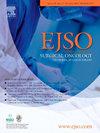新辅助吉西他滨加顺铂三联治疗胆道癌伴淋巴结转移的研究
IF 3.5
2区 医学
Q2 ONCOLOGY
引用次数: 0
摘要
胆道癌(BTC)是罕见的。通过FDG-PET或活检诊断的淋巴结转移患者(被认为是“生物学上可切除的”)的治疗结果很差。然而,围手术期治疗仍在发展中。最近,吉西他滨+顺铂(GC)为基础的三联方案已经开发用于不可切除的BTC。我们采用以gc为基础的三联疗法治疗伴有淋巴结转移的BTC。方法对30例经FDG-PET或活检诊断为LN转移的患者(以GC为基础的三联组)进行GC + S-1治疗(GCS)或nab-紫杉醇治疗(GCnP)。使用FDG阳性LNs的BTC数据集作为对照(前期手术组,n = 19),该数据集先前用于根据FDG摄取分析诊断和治疗结果。结果22例患者使用gcs, 8例患者使用GCnP。治疗中位期79天,客观有效率47%,肿瘤控制率87%,22例患者行R0切除术(73%)。除了主要肿瘤对FDG的摄取外,各组间无显著差异。基于gc的三联组和前期手术组的3年总生存率分别为45.4%和15.8% (P = 0.0052);无进展生存期和无复发生存期无显著差异。亚分析显示,规范化CA19-9水平比非规范化CA19-9水平提供更好的生存率。结论基于gc的新辅助三重方案可提高FGD-PET或活检诊断为淋巴结转移的BTC患者的生存率。CA19-9正常化可能对指示手术有用。本文章由计算机程序翻译,如有差异,请以英文原文为准。
Investigation of neoadjuvant gemcitabine plus cisplatin-based triplet regimens on biliary tract cancer with possible lymph node metastasis
Introduction
Biliary tract cancer (BTC) is rare. The treatment outcomes in patients with lymph node (LN) metastasis diagnosed by FDG-PET or a biopsy—who are considered to be ‘biologically borderline resectable’—are poor. However, perioperative treatment is still under development. Recently, gemcitabine plus cisplatin (GC)-based triplet regimens for unresectable BTC have been developed. We applied GC-based triplet therapy in BTC with LN metastasis.
Methods
We administered GC plus S-1 therapy (GCS) or nab-paclitaxel therapy (GCnP) to 30 patients with LN metastasis diagnosed by FDG-PET or a biopsy (GC-based triplet group). A dataset of BTC with FDG-positive LNs, previously used for an analysis of the diagnosis and treatment outcomes according to FDG uptake, was used as a control (upfront surgery group, n = 19).
Results
GCS and GCnP were used by 22 and 8 patients, respectively. The median treatment period was 79 days, the objective response rate was 47 %, the tumor control rate was 87 %, and 22 patients underwent R0 resection (73 %). The groups showed no significant differences with the exception of the FDG uptake by the main tumor. The three-year overall survival (OS) rates in the GC-based triplet and upfront surgery groups were 45.4 % and 15.8 %, respectively (P = 0.0052); there were no significant differences in progression-free or recurrence-free survival. A sub-analysis showed that normalized CA19-9 levels provided better survival than non-normalized CA19-9 levels.
Conclusion
Neoadjuvant GC-based triplet regimens could provide survival benefits in BTC with LN metastasis diagnosed by FGD-PET or a biopsy. CA19-9 normalization may be useful for indicating surgery.
求助全文
通过发布文献求助,成功后即可免费获取论文全文。
去求助
来源期刊

Ejso
医学-外科
CiteScore
6.40
自引率
2.60%
发文量
1148
审稿时长
41 days
期刊介绍:
JSO - European Journal of Surgical Oncology ("the Journal of Cancer Surgery") is the Official Journal of the European Society of Surgical Oncology and BASO ~ the Association for Cancer Surgery.
The EJSO aims to advance surgical oncology research and practice through the publication of original research articles, review articles, editorials, debates and correspondence.
 求助内容:
求助内容: 应助结果提醒方式:
应助结果提醒方式:


